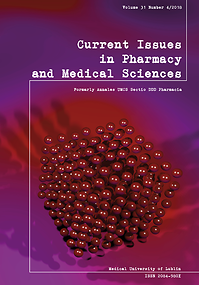Developing a diagnostic test to identify the selected mutation within the CFTR gene that determines the onset of cystic fibrosis
DOI:
https://doi.org/10.1515/cipms-2018-0037Słowa kluczowe:
CF – cystic fibrosis, CFTR – cystic fibrosis transmembrane conductance regulator, EnaC – epithlial sodium channel, ROMK – renal outermedullary potassium channel, ORCC – outwardly rectifying chloride channel, CBAVD – congenital bilateral absence of the vas deferent, WHO – World Health Organization, ECFTN – European Cystic Fibrosis Society, PCR – polymerase chain reactionAbstrakt
Cystic fibrosis is one of the most common genetic diseases among Caucasians due to its prevalence. Modern methods of molecular diagnostics and treatment of the disease allow to prolong the life of patients. In order to apply the appropriate treatment, the genetic basis of this disease should, however, first be known. The most common and the most severe mutation present in the CFTR gene (60-70% of cases) takes the form of an allele. This is responsible for the deletion of phenylalanine in position 508 (Δ508) of the CFTR protein. Determination of mutations in the CFTR gene using molecular techniques makes it possible to identify the causes of the disease in people who do not show the characteristic symptoms of cystic fibrosis.
Bibliografia
1. Dequeker E, Cuppens H, Dodge J, Estivill X, Goossens M, Pignatti PF, et al. Recommendations for quality improvement in genetic testing for cystic fibrosis European Concerted Action on Cystic Fibrosis. Eur J Hum Genet. 2000;8(2):S2-24.
2. Dork T, Macek M, Mekus F, Tümmler B, Tzountzouris J, Casals T, et al. Characterization of a novel 21 - kb delection CFTR dele 2, 3 (21kb) in the CFTR gene: a cystic fibrosis mutation on Slavic orgin in common in Central and East Europe. Hum Genet. 2000;106:259-68.
3. Stężowska-Kubiak S. Epidemiological and clinical characteristics of the Polish population of patients suffering from cystic fibrosis. 2011.
4. Bal J, Maciejko D, Mazurczak T, Potocka A, Krawczak M, Reiss J. Frequency of the cystic fibrosis mutation delta F508 in Poland. Hum Genet. 1991;86:329.
5. Pogorzelski A, Witt M, Bal J. CFTR gene mutations in patients with cystic fibrosis in Poland. Acta Pneumono Allergol Ped. 1998;2:5-8.
6. Witt M, Bal J, Maciejko D, Mazurczak T. Incidence of CFTR gene mutations in patients with cystic fibrosis in Poland. Pediatr Pol. 1997;72:665-8.
7. Bobadilla J, Macek M Jr., Fine J, Farel P. Cystic Fibrosis: a worldwide analysis of CFTR mutations – correlation with incidence data and application to screening. Hum Genet. Mut. 2002;19:575-606.
8. French CF Registry – Annual Data Report 2007. Paris: Vaincre la Mucoviscidose and INED; 2010.
9. UK CF Registry Annual Data Report 2008. Cystic Fibrosis Trust; 2009.
10. Annual Report 2007. The Cystic Fibrosis Registry of Ireland; 2009.
11. Cystic Fibrosis in Australia 2008. 11th annual report from the Australian Cystic Fibrosis Data Registry. Australia: Cystic Fibrosis; 2010.
12. www.cysticfibrosis.ca
13. Sens B, Stern M. Qualitätssicherung Mukoviszidose. Überlich über den Gesundheitszustand der Patient in Deutschland 2009. Hippocampus Verlag KG;2010.
14. Shamseer L, Adams D, Brown N, Johnson JA, Vohra S. Antioxidant micronutrients for lung disease in cystic fibrosis. Cochrane Database Syst Rev. 2010;12:CD007020. DOI: 10.1002/14651858.CD007020.pub2.
15. Sanchez-Garcia J, Benet J, Gutierrez-Mateo C, Luís Séculi J, Monrós E, Navarro J. Multiple mutation analysis of the cystic fibrosis gene a single cells. Mol Hum Reprod. 2005;11:463-8.
16. Dreesen J, Jacobs L, Bras M, Herbergs J, Dumolin JCM, Geraedts JPM et al. Multiplex PCR of polymorphic markers flanking the CFTR gene; a general approach for pre-implantation genetic diagnosis of cystic fibrosis. Mol Hum Reprod. 2000;6:391-6.
17. Moutou C, Gardes N, Viville S. Multiplex PCR combining deltaF508 mutation and intragenic microsatellites of the CFTR gene for pre-implantation genetic diagnosis (PGD) of cystic fibrosis. Eur J Hum Genet. 2002;10:231-8.
18. Goosens V, Sermon K, Lissens W, De Rycke M, Saerens B, De Vos A, et al. Improving clinical preimplantation genetic diagnosis for cystic fibrosis by duplex PCR using two polymorphic markers or one polymorphic marker in combination with the detection of the DF508 mutation. Mol Hum Reprod. 2003;9:559-67.
Pobrania
Opublikowane
Numer
Dział
Licencja
Prawa autorskie (c) 2019 Autorzy

Praca jest udostępniana na licencji Creative Commons Attribution-NonCommercial-NoDerivatives 3.0 Unported License.


